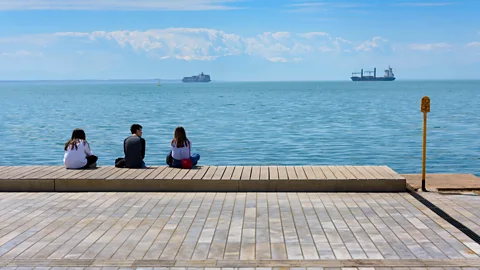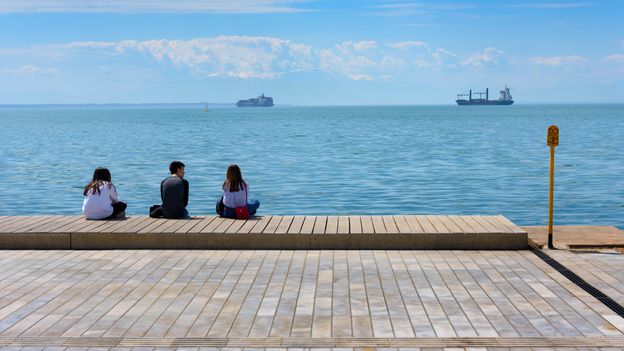By Jessica BatemanFeature Matching

 Alamy
AlamyCould venture capitalists offer young Greek talents a way home?
The story of Antonios Chalkiopoulos is typical of that of many Greeks. After studying in London, he returned to Athens in 2002 and worked in software engineering.
“Then the crisis arrived,” he said. “I decided to return to the UK and look for new opportunities. »
From Greece on the verge of bankruptcy in 2010, life has been particularly hard for the country’s young people. Even if there are finally some small signs of recovery, the economy increased by 1.6% in 2017 and the country should exit its rescue program in August – unemployment of under 25s remains around 45%.
For those lucky enough to find a job, options are limited. Average salaries are around €700 ($856) per month, and it’s one of the most expensive and difficult places to start a business in Europe.
It is therefore no wonder that up to 180,000 graduates have left the country look for work elsewhere over the past eight years. And surveys suggest that up to 76% of adolescents consider studying or working abroad.
“We have already experienced mass migration from Greece (in the post-war decades), but this is different because it is a real qualitative flight,” explains Aliki Mouriki of the Greek National Research Center social. “It’s the most educated people who are leaving, and the UK and Germany are benefiting because they haven’t paid a single euro for their education.”

 Getty Images
Getty ImagesHuman capital flight, or “brain drain” – when highly skilled workers leave their countries for opportunities abroad – can weigh heavily on the economies of poorer countries around the world.
Governments and academics are working hard to combat these trends, training research Or Distance learning programs to determine what would attract top graduates to return.
But Chalkiopoulos is part of a very different type of project, one driven by market economics.
Venture out
His software company Landoop, which he founded in London, received a $1 million investment last year from Marathon Venture Capital, a venture capital fund specifically targeting Greek entrepreneurs. But there’s a catch: He has to spend about half of that money in his home country and build part of his team and business there.
A venture capital company is created by a group of wealthy investors, banks or financial institutions, who come together to provide a “seed-stage” investment, or injection of cash, to get one or more businesses off the ground. several new businesses. The venture capitalist will then often expect equity in return.
Panos Papadopoulos manages Marathon Venture Capital. He wants to use the skills migrant workers learn abroad to help create those same opportunities in Greece.
“Most local entrepreneurs only serve the Greek market,” he says. “We’re looking for founders who want to solve global problems and have a global mindset. We’re building mini-multinationals,” although he adds that the fund will continue to work with entrepreneurs based entirely in Greece “if it’s the right type of business.”
The Marathon fund receives money from the Greek government, the European Investment Fund and the European Investment Bank. They provide 50-90% of the capital and Marathon typically takes a 15-20% stake in the companies. The EIF, the EIB and the Greek government have invested a total of $320 million in nine different venture capital companies.
Papadopoulos claims that even though Marathon owns the shares, its investors, including the Greek government, are entitled to a share of the profits “if anyone wants to acquire our stake in the company we invested in.”

 Getty Images
Getty ImagesNothing better than being at home
How do you convince someone to expand their business in a country where the economic outlook and business environment are still bleak?
According to Astyanax Kanakakis, CEO and co-founder of Stockholm-based technology company norbloc, one of the first companies Marathon invested in, it is an emotional decision ultimately linked to the feeling of being at home. self. “I have lived in many different countries and Athens is always the place I feel most at home,” he says. “Most of my friends who came back did so out of nostalgia rather than because they had a great business opportunity. »
Papadopoulos agrees. “People are not rational…it’s a question of emotion, it’s a question of trust. It’s easier to build trust if you share the same language and experiences. He also believes that the founders he works with want to help create better opportunities for other Greeks.
When offered the investment, Kanakakis was already looking to build an overseas hub that would be well located for visiting clients in Europe and the Middle East, so the opportunity “made sense”. His company now has seven employees in Greece – some of whom previously worked abroad and wanted to return home – and he hopes to have 25 by the end of the year.
However, he describes the process of creating a subsidiary in Greece as “extremely painful”. If I were a new entrepreneur, I don’t know if I would bother.
No loss, no gain
A similar, more mature venture capital model could already be established in Israel. After going through difficult economic times THE 1970s and early 1980s the country has become a hub of technology and innovation. Part of this growth was driven by the government’s Yozma Fund, which invested in Israeli and Israel-linked companies and helped revive the country’s venture capital ecosystem. The industry that has grown up around it is heavily focused on “brain drain” to Israel’s advantage. There is approximately 60,000 to 100,000 Israelis live in Silicon Valley and more than 100 Israeli-led start-ups in the region, and a range of organizations have been created to attract Israeli tech talent to the United States and connect companies with American investors.
“We don’t have a local market to sell to,” says Yaron Samid, founder of TechAviv, an international network of Israeli founders. “So once an Israeli tech company reaches a certain stage, it will look to build a front office in the market it serves – which is usually the US – but leave its engineering teams in Israel. These offices then learn directly the latest and best techniques from the Valley.
“Often, founders settle in the United States, Asia or Europe. Once they sell their business, they return to Israel and start their next business there. People are very patriotic and love the lifestyle we have here.
Some scholars argue that countries can naturally benefit from human capital flight when workers return with new skills. For example, Devesh Kapur, a professor of political science at the University of Pennsylvania, has argued that Indians in Silicon Valley have shaped the structure of the Indian venture capital industry and have also helped Indian venture capital companies. software. break into the American market. “If people come back, it will balance the flight, because they will bring with them not only professional skills, but also social and personal skills,” recognizes Mouriki. The VC model could potentially accelerate a trend that can happen organically.
However, Kapur is skeptical about the extent to which venture capital could help developing country economies. “It’s still very small for most countries, you need to have a sophisticated technology sector and human capital – there must already be fertile ground for any venture capital industry to take off,” says -he.
This model is also not suitable for all entrepreneurs, explains Kanakakis: “By stipulating that you have to spend a certain amount of money in Greece, you are forcing a company to make a business decision. And it may not be the right time for them to make this decision.
Marathon has already invested in five companies with two more in the pipeline, and has created 20 tech jobs in Greece. It plans to fund 20 companies in total over the next four years. “If we succeed, we will have two or three companies each employing around 1,000 people,” says Papadopoulos.
Kanakakis adds: “I am cautiously optimistic. I hope that projects like this will spark changes in mentalities, which will then spread.
—
To comment on this story or anything you’ve seen on BBC Capital, please visit our Facebook page or send us a message on Twitter.
If you liked this story, sign up to BBC.com’s weekly features newsletter “If you only read 6 things this week“. A hand-picked selection of stories from BBC Future, Culture, Capital and Travel, delivered to your inbox every Friday.
{“image”:{“pid”:””}}


